|
Cornwall Folk
Following
the release of the CD 'Oh for Summer', writer and
Incredible String Band folklorist, Grahame Hood reflects on the
Famous Jug Band and their links with Ralph McTell and the Folk
Cottage at Mitchell.
They were named
ironically, of course, though they certainly were a band,
featured a jug, and for a year or so were moderately famous in
the days when every town of any size in Britain had at least one
folk club, not to mention every college and university.
They were Henry
Bartlett, Pete Berryman, Jill Johnson and Clive Palmer. In the
summer of 2000 they got together again for the first time since
1969. The CD 'Oh for Summer' is the happy result.
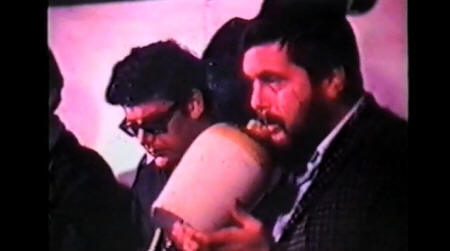 Let's start with
Henry (picture right); real name Michael Bartlett, but his stature and beard
inevitably led to him being nicknamed Henry VIIIth and it stuck.
He came from Mitcham in Surrey, and was part of a crowd who
enjoyed folk, blues and jazz music, as was his friend Ralph
McTell. Henry ran a few folk clubs in the mid sixties; the
Buck's Head in Mitcham and the fondly remembered Olive Tree Café
in Croydon among them. Let's start with
Henry (picture right); real name Michael Bartlett, but his stature and beard
inevitably led to him being nicknamed Henry VIIIth and it stuck.
He came from Mitcham in Surrey, and was part of a crowd who
enjoyed folk, blues and jazz music, as was his friend Ralph
McTell. Henry ran a few folk clubs in the mid sixties; the
Buck's Head in Mitcham and the fondly remembered Olive Tree Café
in Croydon among them.
Henry loved obscure
jug band and blues records and by 1965 was a member of a band
called The Levee Breakers who played around the South East and
even got to record a single for Parlophone. Henry sang and
played the jug, which a skilled player can blow across the mouth
of to produce a pleasing bass sound. It was used commonly by
poor rural bands in the US in lieu of a double bass.
In the summer of 1967
Ralph (pictured below at Folk Cottage) went down to Cornwall where there was a living to be made busking and playing in pubs and at caravan sites. He rented a
caravan in the country between Mitchell and Newquay. Nearby was
the Folk Cottage club, which literally was an old cottage, with
a snack and coffee bar downstairs and the club room upstairs.
Despite its structural instability and poor sanitation (one
Elsan only) it was hugely popular in the summer season, being
open Monday, Tuesday, Thursday and Friday nights. Ralph invited
Henry (and his jug) down for his summer holidays, which is when
he met his wife-to-be, Jenny.
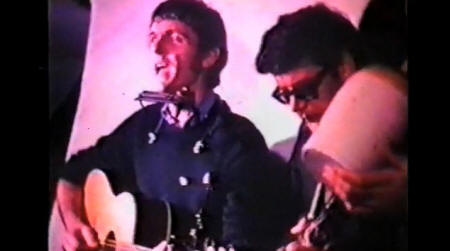 Henry had hardly
returned to London when Ralph phoned to say that the organizers
of the Folk Cottage wanted to give it up and would he like to
take over? Henry was down in Cornwall like a shot, moving into a
caravan next to the Cottage with "Whispering" Mick Bennett,
percussionist, chef (specializing in pasties, soup and curried
shepherd's pie) and owner of a very loud voice. Henry had hardly
returned to London when Ralph phoned to say that the organizers
of the Folk Cottage wanted to give it up and would he like to
take over? Henry was down in Cornwall like a shot, moving into a
caravan next to the Cottage with "Whispering" Mick Bennett,
percussionist, chef (specializing in pasties, soup and curried
shepherd's pie) and owner of a very loud voice.
A mutual friend
introduced Henry to guitarist Pete Berryman who was busking (he
was playing "Hey Joe" at the time) on the beach at Newquay. Pete
had played in rock bands mainly, and had even recorded a single
for EMI as a member of the Shondells. In 1966 he had toured
England with a folk group called the Haverim.
Invited along to the
Cottage, Pete became part of The Great Western Jug Band with
Henry, Mick, mandolinist Bob Strawbridge and John The Fish, a
guitarist known for his work with Cornish singer Brenda Wooton,
who ran another well-known club at St Buryan's near
Penzance. Some of the group played on Ralph McTell's first album
and a photo of Henry, Mick, John and Pete appeared on the back
of Ralph's second album.
In September 1968,
Henry and Jenny were married and moved to Penzance. A month or
so later, Clive Palmer turned up one night at St Buryan's
wearing, Jenny recalls, a coat he had made himself from old Army
blankets. He moved into the caravan with Mick.
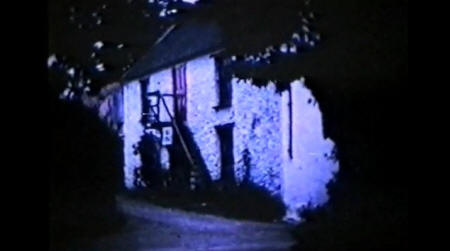 Clive was born in
Edmonton, North London, the youngest son of a typewriter
engineer who worked in the City, and was given his first banjo,
an old Cammayer, by his elder brother. Going for a half-crown
lesson every week, he learned to play in the classical
finger-picking style, which was something of a dying art even
then. Affected by polio, and on his way to becoming a
self-confessed black sheep, "they didn't know what to do with
me", he was allowed to attend Hornsey Art College at the age of
fifteen, which introduced him to lot of new ideas and gave him a
far better social life than most people of his age. Clive was born in
Edmonton, North London, the youngest son of a typewriter
engineer who worked in the City, and was given his first banjo,
an old Cammayer, by his elder brother. Going for a half-crown
lesson every week, he learned to play in the classical
finger-picking style, which was something of a dying art even
then. Affected by polio, and on his way to becoming a
self-confessed black sheep, "they didn't know what to do with
me", he was allowed to attend Hornsey Art College at the age of
fifteen, which introduced him to lot of new ideas and gave him a
far better social life than most people of his age.
In summer he worked as
a pavement artist in Trafalgar Square, playing his banjo at
night in the folkier coffee bars of Soho. In the days of skiffle,
when a banjo player was considered hot if they knew more than
three chords, he was streets ahead of other players in his
technique. Wizz Jones first met him around this time, and
affectionately remembers Clive "maintaining an aura of
mysterious aloofness". Wizz and Clive later busked together in
Paris in the summer of 1959 and 1960.
Around 1962 he found
himself in Edinburgh, and began working with a local musician
called Robin Williamson. As Robin and Clive, they made a modest
living in the folk clubs of Scotland and the North East of
England, making their first recordings in 1963 for a compilation
album called "Edinburgh Folk Festival Vol 1", on which they
performed an instrumental ragtime banjo/guitar duet called "Jazzbo's
Holiday".
Eventually adding a
rhythm guitarist by the name of Mike Heron, they became the
Incredible String Band and recorded their first album in 1966.
Almost as soon as the album was released, the group split, with
Robin going to live in Morocco and Clive fulfilling a long-held
ambition to travel to India.
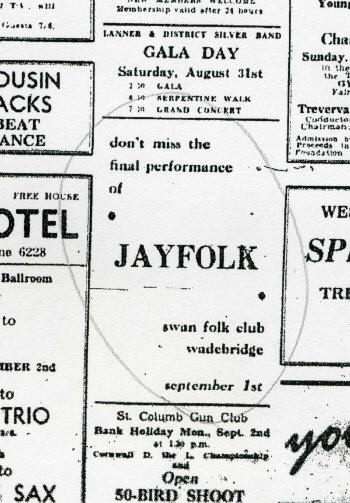 Robin returned to the
UK when his money ran out and rejoined Mike to reform the String
Band, going on to make some of the most remarkable music of
their time until their eventual demise in 1974. Robin returned to the
UK when his money ran out and rejoined Mike to reform the String
Band, going on to make some of the most remarkable music of
their time until their eventual demise in 1974.
Clive was back in the
UK by October 1967 at least; the Folk page of the Melody Maker
advertising his appearance at Les Cousins on Friday 19th. "Very
fine banjo player. Come early to obtain seats". He also played as
a duo with Wizz Jones for a while around this time.
Pete, Clive and Henry
formed a trio, and tongues in collective cheeks, called
themselves the Famous Jug Band. Taking a break from rehearsing
one night they visited the Wadebridge Folk Club to play a few
songs. Jayfolk from Truro were playing and all concerned
were very impressed with their 18-year-old singer.
Jill Johnson had
formed the group at the age of 14 (all long hair and beads) with
her twin sisters and her best friend and they had been playing
hotels, folk clubs and festivals since. The FJB asked Jill if
she would be interested in working with them, and with
rehearsals going well, had to ask her father if she would be
allowed to go on a tour in the early part of 1969. He agreed.
(The feelings of
Jill's fiancé, one Roger Meddows-Taylor, a dental student in
London, are not recorded. He should worry. He ended up as the
drummer in Queen.)
While on tour, Wizz
Jones rang to suggest they paid a visit to Pierre Tubbs, "Head
of creative services" for United Artists/Liberty records, who
had recently signed Wizz on the recommendation of Roy Harper.
Invited to Pierre's office, the FJB ran through a few songs and
Mr.Tubbs had to admit he was impressed. "I loved Jill's voice.
That's why I signed the buggers!"
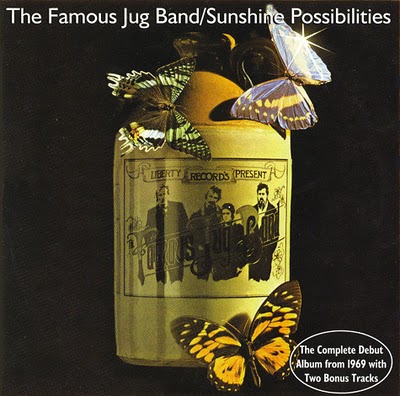 "Sunshine
Possibilities" was recorded in a maximum of two days and
released in July, preceded by a single "The Only Friend I
Own"/"A Leaf Must Fall" in May. It is a very varied, but highly
enjoyable album, with tracks ranging from a solo guitar workout
through a mildly amusing barber-shop quartet number to "A Leaf
Must Fall", an outstanding ballad by Clive, sung beautifully by
Jill. "Sunshine
Possibilities" was recorded in a maximum of two days and
released in July, preceded by a single "The Only Friend I
Own"/"A Leaf Must Fall" in May. It is a very varied, but highly
enjoyable album, with tracks ranging from a solo guitar workout
through a mildly amusing barber-shop quartet number to "A Leaf
Must Fall", an outstanding ballad by Clive, sung beautifully by
Jill.
The jug band sound is
at its best on "Only Friend I Own", a song by Pete in the good
old "lost my girl but still got my guitar " vein, and the joyful
"Saro Jane" which features a great jug solo by Henry!
Exactly where, when
and why Clive left, no one remembers for sure. Jill vaguely
recalls him staying behind after a gig at and not turning up for
the next one. Jenny is pretty certain this must have been about
July, as she was heavily pregnant with their first child, who
was born in August, and that was the only time she ever went on
tour with them. They certainly played the Cambridge Folk
Festival, in the first week of August, as a trio.
Wizz Jones nearly
joined them at this point, but again memories are vague. He
definitely remembers rehearsing. Henry thinks they may have done
a couple of gigs together at the Folk Cottage, and one reference
source suggests Wizz did two radio broadcasts with them. In May
and June!
Clive returned to
Cornwall and formed a band called The Stockroom Five with Mick
Bennett, John Bidwell and Tim Wellard, playing old-time country
music by the likes of Uncle Dave Macon. They evolved into the
Temple Creatures whose music was much more ethereal, with many
Eastern influences. In 1971 Clive formed C.O.B.(Clive's Original
Band) with Mick and John, who went on to make two albums, both
of which are now very rare.
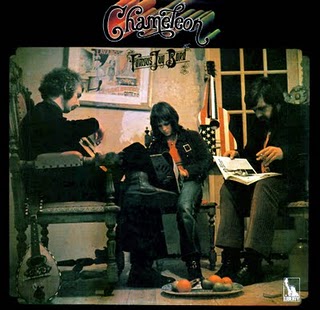 The FJB continued as a
trio. Clive's absence meant that both Pete and Jill had to take
a larger share of the lead vocal duties, but they both rose to
the challenge. The first album had only sold moderately, but
Liberty were happy for the band to record a second one,
especially as recording costs were likely to be low. They also
advanced them the money for a Transit van and a new Simms-Watt
PA system, though the band did have to take a Liberty Records
publicity board with them to every gig. The FJB continued as a
trio. Clive's absence meant that both Pete and Jill had to take
a larger share of the lead vocal duties, but they both rose to
the challenge. The first album had only sold moderately, but
Liberty were happy for the band to record a second one,
especially as recording costs were likely to be low. They also
advanced them the money for a Transit van and a new Simms-Watt
PA system, though the band did have to take a Liberty Records
publicity board with them to every gig.
The FJB also had a
sponsorship deal with The Cornish Mead Company and gave out
small promotional samples in miniature jugs emblazoned with the
band's logo.
The Jug Band's second
album "Chameleon" was issued in 1970. Many of the songs were by
Pete and his songwriting had improved immeasurably since
"Sunshine". The basic sound was simply three voices, a guitar,
and a jug, with only a few overdubs (percussion and electric
guitar) added. Perhaps surprisingly, it worked. Some of the
material was extremely ambitious, notably "Golden Years" with
its subtle use of electric guitar and time changes. The final
track "Chameleon" which ran into Michael Chapman's song "Rabbit
Hills" was lovely.
The touring continued
and the band acquired a new manager, who suggested that they
base themselves in London. They nearly split up at the end of
the summer, Pete intending to form a band with guitarist John
James. Instead the FJB decided to carry on and invite John to
join them.
After only two gigs it
became obvious it was not going to work and John left. They
placed an advert in Melody Maker for new musicians (Pete at one
time talking of electrifying the band and even adding drums and
a horn section) and were joined by a Hammond organist by the
name of Tim Rice (not the famous lyricist). Jill began to find
the schedule too stressful and started to become ill. The band
split when she left in April 1971. "Pete drove me down to
Cornwall, dropped me off at my parent's house - and then left! I
didn't hear from anyone for 25 years!"
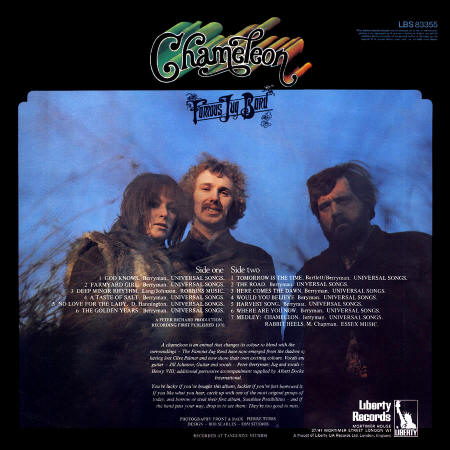 Jill recovered and
eventually moved to California, latterly teaching business
computer applications at a college. She returned to Britain for
a holiday in 1994, and met up with Henry again. Jill recovered and
eventually moved to California, latterly teaching business
computer applications at a college. She returned to Britain for
a holiday in 1994, and met up with Henry again.
Henry had stayed on in
London and played with various other musicians, as well as
running clubs. In 1974 C.O.B. split up and Henry joined Clive
and guitarist Chris Newman to form a band to play the dates
C.O.B. were still contracted to do. When Clive married the same
year, Henry was best man. Henry got involved in the antiques
trade, eventually moving down to Dorset. He met up with Pete
again in 1989 at a Cornish reunion gig organized by Ralph McTell.
Since leaving the FJB,
Pete had carved out a solo career, particularly in Europe, and
played in many combinations with musicians such as John James,
Julie Felix and Brenda Wooton. He had recorded with Clive in the
mid-seventies and in 1994.
Clive himself had
returned to live in Cornwall, doing occasional gigs, and
recording several cassette-only albums while working for the
local council. He eventually took early retirement and moved to
Brittany.
By the mid-nineties
interest in the Incredible String Band and their offshoots was
growing, helped by CD reissues of their earlier albums and a
fanzine called "Be Glad". I was involved with the magazine from
the first issue, to which I contributed a piece on Clive,
concentrating on his time with C.O.B. In early 1997, I got in
touch with Henry about doing an article on the history of the
FJB and visited him twice at his home in Ibberton, Dorset. He
had recently made contact with Jill again, and they had started
writing songs together (by post, and later, internet). The
article appeared in the summer 1997 issue of 'Be Glad', and led to
Clive making contact with Henry.
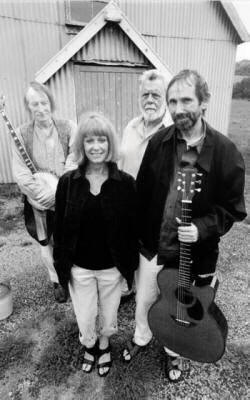 Things were stirring
in the Incredibles camp. Robin and Mike had got back together
for two gigs and in 1999 Robin and Clive released an album
called "At The Pure Fountain" and did a short tour to promote
it. Things were stirring
in the Incredibles camp. Robin and Mike had got back together
for two gigs and in 1999 Robin and Clive released an album
called "At The Pure Fountain" and did a short tour to promote
it.
1999 also saw the CD
reissue of "Sunshine Possibilities", with two extra tracks from
"Chameleon" added. On the penultimate day of the 20th century,
Robin, Mike and Clive played a one-off gig in Edinburgh. This
set the stage for a proper ISB reunion tour in August 2000 with
the original trio joined by Robin's wife Bina and keyboard
player Lawson Dando.
All of this meant that
Clive was spending more time in the UK than he had done for a
long time and the possibility of an FJB reunion became a real
one. Pierre Tubbs was approached and happily agreed to produce a
new recording, and a date was finally found when Jill could come
to the UK, Clive was here to work with the Incredibles and Pete
could find a gap in his gigging and teaching schedule.
An ex-BBC engineer
with his own mobile studio was found living only a few miles
from Ibberton, and in summer 2000, 18 basic tracks were laid
down in the Village Hall. Fortunately it didn't rain, this being
made of corrugated iron, though the odd farm animal noise had to
be removed from the tape. The basic tracks were completed in
less than two days, with extra parts being added later in
studios in London, Cornwall and California.
'O for summer'. The
title track is classic Clive, with his voice and banjo sounding
like dusk falling. Lovely guitar from Pete and harmonies from
Jill. And the jug. A reminder that the FJB were really rather
special.
Grahame Hood July 2001.
The top three
images are from a film made by the Newquay Film Society in 1968.
Grahame's Empty Pocket Blues is available through Amazon. See
also interviews section of artcornwall.org
|